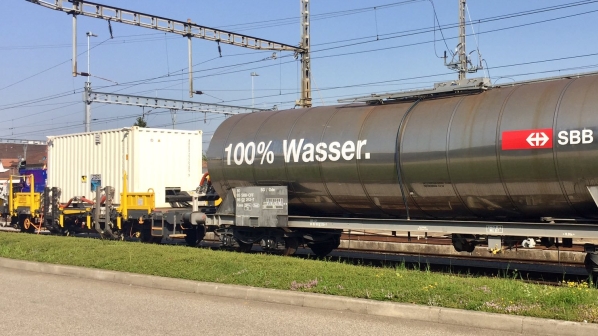Glyphosate is currently the only herbicide in Switzerland approved for use around railway facilities. SBB says staff are restrained and prudent as possible when using the herbicide, by only applying it on foot while directing the spray at the base of weeds to specifically target unwanted plants and avoid it spreading. SBB is also a comparatively small consumer, using less than 2% of glyphosate sold throughout Switzerland.
However, the railway says the herbicide still has a negative environmental impact, and launched a programme in early 2018 to identify a range of alternatives to suit the different environments around the railway. The trials have been ongoing since the beginning of 2018 and will last for several years, evaluating the different weed control methods based on ecological and economic criteria.
The alternatives include:
Hot water
SBB says one of the most promising alternative methods is the use of a hot water spraying vehicle, which was presented at Olten on June 27. SBB has developed a test vehicle equipped with a sensor which detects plants and specifically sprays hot water to kill unwanted weeds.
As part of a pilot project, the hot water spraying vehicle has already completed its first test runs, with further tests planned from August to ensure it is technically and operationally ready.
Antifouling materials
The possible structural measures reduce plant growth, with 20 options reviewed, six of which will be followed up, installed and monitored from 2020.
Green carpet
This involves the targeted use of ground cover plants to prevent the growth of harmful weeds in marginal area. Possible seed mixtures were determined and have already been sown in a collaboration with the French National Railways (SNCF), which is undertaking a similar project.
Robotics
A feasibility study found the use of robots for autonomous vegetation control is realistic. However, this method involves enormous technological challenges and financial unknowns. The approach is being explored, but a functioning operational solution is not likely to be available from at least 2025 at the earliest.
(Bio) herbicides
SBB is also testing the use of alternative herbicides, but says that if chemical substances - biological or otherwise - are used, they must be environmentally friendly. Working in cooperation with railways BLS and SOB and the Federal Office of Transport (FOT), research is underway to analyse the impact of alternative substances on groundwater protection.
The substances will only be approved when it is established what impact they will have on water.

